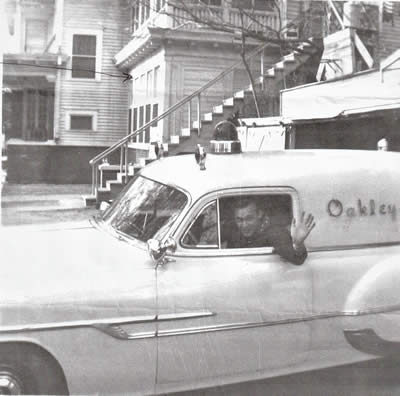
July 2, 2020 - “Boy, *Willie is in a heap of trouble with the boss,” Gary told me when I walked into the funeral home office. “I sure hope he doesn’t get fired.”
In 1955 I was a 19-year-old college student attending Stephen F. Austin University in Nacogdoches, Texas. Since money was hard to come by in those days, I had to work after classes in order to meet expenses. I had been hired by the Oakley-Metcalf Funeral Home to live on premises and work as a general flunky. I was paid the awesome sum of $120 per month, plus my room. Seems very puny money today, but then it was a fairly decent job for a college student.
Oakley-Metcalf owned an emergency ambulance, affectionately known as the “hot shot,” a hearse, and a transfer ambulance. The transfer ambulance had been converted to hold a cot for non-emergency sick calls.
Besides myself, there was Gary, an older fellow, married, who lived in the apartment above the ambulance garage with his wife, Ruth. Then there was Willie. His job at the funeral home was to keep the grounds neat, dig the graves, set up and take down the funeral tent, keep the ambulances washed, and full of gas. Willie usually attended to these chores very well.
The particular week in question had been a very busy week, with several funeral services. On this particular day, there was an auto accident several miles out North Street in Nacogdoches. Skinny Garrison, our boss, jumped into the “hot shot” and headed out to the scene, red lights flashing and the siren blaring in response to the call for help. While he was still on North Street, the ambulance ran out of gas.
What a revolting development this turned out to be! He coasted into a service station and yelled for the attendant to put in $2.00 worth of gasoline as fast as possible. While doing this, his competitor, Cason-Monk Funeral Home, roared by in their emergency ambulance and thus got in the lead.
By the time Skinny Garrison reached the scene, Cason-Monk had already loaded up the deceased driver, and was headed back to the funeral home. Skinny ended up taking one slightly injured driver to the hospital. Back in 1955, it was more profitable to conduct a funeral than it was to transport an injured person to the hospital. Thus, one can see why our boss was so embarrassed, and thus angry at Willie.
“Well, Gary, I feel sorry for Willie. I hope the boss will remember all the things he has done right over the years,” I opined.
The boss gave Willie a “lecture” about his failure to keep the ambulances full of gas and not to let it happen again. I think Skinny knew that this incident was an honest mistake and that Willie was a good employee. So, nothing further was said bout “running out of gas,” and it never happened again while I was there.
• Name changed to protect the guilty.









